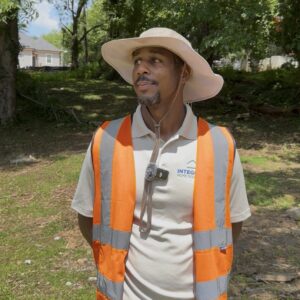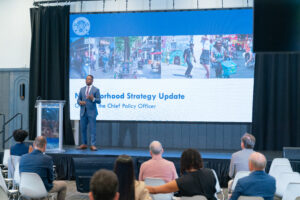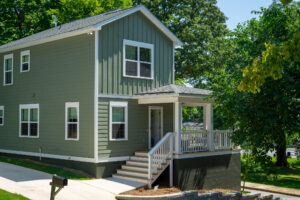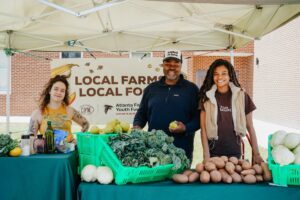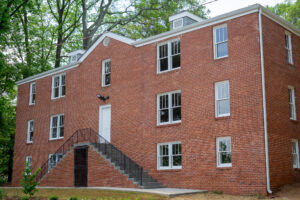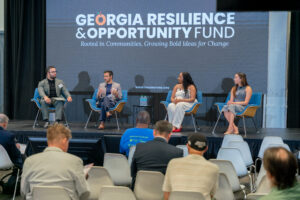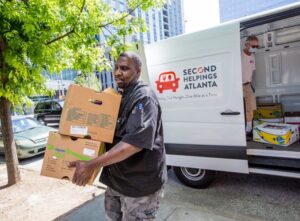In 2019, Food Well Alliance and Westside Future Fund partnered to purchase and revitalize 970 Jefferson St. NW, the historic site of the Atlanta Community Food Bank. Bill Bolling and John Ahmann played pivotal roles in making this acquisition a reality, turning a shared vision into a success. The two organizations collaborate on managing the facility, with Food Well Alliance overseeing the warehouse and upstairs space, while Westside Future Fund is responsible for maintaining the rest of the building.
Today, 19 nonprofits and local enterprises utilize 970 Jefferson, operating from this revitalized space to collectively contribute to the betterment of the Westside community and beyond, embodying the shared vision that inspired the partnership. We’ve launched a new series, the 970 Partner Spotlight, to highlight each of these incredible organizations and their work. One of these integral partners is Community Farmers Markets, a nonprofit dedicated to building Atlanta’s local food infrastructure and supporting small farmers through innovative food access programs.
Building Atlanta’s Local Food Infrastructure, One Market at a Time
From neighborhood farmers markets to fresh food pop-ups at local schools, Community Farmers Markets (CFM) is helping to grow a more resilient, more sustainable food system across Atlanta. And through their presence at 970 Jefferson Street NW, they’ve found not just a home base — but a hub for mission-driven collaboration.
“We’re on a mission to build Atlanta’s local food infrastructure, for long-term sustainability and meaningful community impact,” said Casey Hood, Director of Operations & Vendor Support at CFM. “We operate multiple food distribution models and offer support to the 160 small businesses and farmers that work within our markets.”
Founded in 2011, CFM has grown into a multi-faceted food access organization. Their work spans traditional farmers markets, educational outreach, and innovative aggregation and distribution models — all centered on increasing food access and economic opportunity for local growers.
Last year alone, CFM-supported vendors and farmers generated more than $3 million in sales. Their markets welcomed over 210,000 attendees and distributed more than $45,000 in SNAP match benefits to help stretch food budgets.
Fresh Food, Right Where It’s Needed
One of CFM’s most exciting initiatives is their Westside Pop-Up Market model, launched through a grant from the Atlanta Falcons Youth Fund.
“It’s based around an aggregated market model where we sell on behalf of the farmers,” said Hood. “We’ve selected different schools, YMCA, senior centers, Boys and Girls Clubs — and we’re setting up a farm stand for folks that come through. We also pop up once a month at the Home Depot Backyard.”
The program brings farm-fresh produce to accessible community locations and includes a family-friendly educational component.
“We have an educational chef at each of those markets who’s cooking up a recipe,” Hood added. “The kids can try it and also get a little bit of free produce to try the recipe at home.”
A Home Base at 970 Jefferson
For CFM, the 970 Jefferson building has provided more than just space — it’s enabled critical parts of their operations.
“It’s hard to come by cold storage space in Atlanta,” said Hood. “If it wasn’t for 970, we wouldn’t be able to do the aggregation model that we do. It provides the necessary infrastructure that allows us to do consistent programming.”
The shared kitchen has also been essential. “It’s helped us not only with prepping produce and supplies for market, but also with other programs like our Drawdown Georgia project to reduce food waste,” said raevin Hawkins, Food Systems Innovations Manager at CFM. “We’re able to prep produce, make value-added products — it’s a really crucial space.”
The community inside the building has been just as important. “970 is such a hub of all these incredible mission-aligned organizations,” said Hood. “Even for us as we’re sourcing produce — we’ve got the Georgia Peach Truck right there. Food Well Alliance is a great partner. You’ve just got all of these inspiring businesses all working together on the same mission for Atlanta.”
Rooted in the Westside
CFM’s Westside presence continues to grow, with markets now embedded at multiple community sites. Hawkins said proximity to host locations has made their work even more effective.
“Being able to be at 970 and be so close to so many market and host sites has been really promising for us and makes our operations a lot easier,” she said.
And the relationships being built — with neighbors, growers, and community members — are what drive the work forward.
“There’s a lot of great growers in the area,” said Hood. “We were working with Rosario from Westside Historic Gardens just this last week to get her produce out to the Home Depot Backyard. It’s wonderful to make those connections with super-local farmers and be able to bring that out to families in the community.”
Community Farmers Markets is currently seeking funding and partnership opportunities with foundations, organizations, and individuals interested in providing healthy food access on the Westside. Email info@cfmatl.org to connect.
Learn more about how 970 Jefferson is bringing together a collaborative community of service at 970Jefferson.org.


